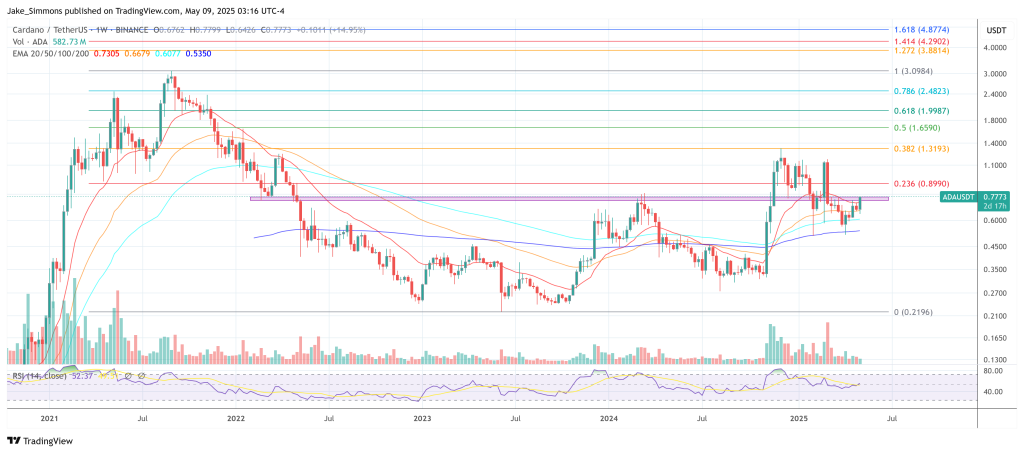Charles Hoskinson has broken months of silence over the mysterious Mar-a-Lago ‘diet coke’ dinner that never was, tracing what he called “a long arc of confusing and strange turns” that began last autumn and culminated in his unexpected removal from former President Donald Trump’s 1 March candle-light fundraiser—an incident insiders had nicknamed the “Diet Coke” meeting.
Streaming from Colorado on May 8, the Cardano creator unfolded a chronology that reached back to the September 2024 SALT conference in Jackson Hole, where he first spoke with advisers who would later join Trump’s transition team. Those conversations, he recalled, centred on establishing a crypto czar and a wider “crypto commission made up of industry leaders.” Hoskinson told viewers he had signalled willingness to serve if the then-presumptive Republican nominee captured the White House.
How The Cardano Founder Didn’t Become Crypto Czar
Trump did win, but the appointment went elsewhere. “David Sacks was announced,” Hoskinson said, noting that the role was ultimately combined with an artificial-intelligence portfolio. A commission chaired by former Congressman Bo Hines remained on the table, yet clarity proved elusive. “Every time we talked to somebody […] people would give us mixed messages,” he explained.
Against that backdrop, Hoskinson secured an invitation to a February 22 “VIP dinner” at Mar-a-Lago, only to be told the event had shifted to 1 March because Trump would be meeting Ukrainian President Volodymyr Zelenskyy. He spent weeks preparing briefing material—“hundreds of documents,” he said—but on the day he boarded a flight to Florida the call came: he had been disinvited. “Excuse me, disinvited? I’ve been preparing for this for a while. I’m on the plane literally flying down,” he recounted.
Hoskinson continued to Florida, where previously scheduled meetings with Senator Tim Scott, Ohio Senate candidate Bernie Moreno and former Speaker Kevin McCarthy proceeded as planned. Yet the explanation for his removal never arrived. The livestream provided the first detailed narrative of what he now believes occurred.
According to Hoskinson, Thursday’s revelation was prompted by the Politico story headlined “From Trump Whisperer to West Wing Pariah: How Lobbyist Brian Ballard Angered Trump.” The article reveals that lobbyist Brian Ballard—or someone “in Ballard’s orbit”—tricked Trump into making a Truth Social post about a XRP, ADA and SOL “crypto reserve.”
In early March a draft list of reserve assets had surfaced showing Cardano’s ADA among them, alongside XRP and others. The Cardano founder insists his public position has always been that “if they’re going to do a reserve, it’s only going to be Bitcoin,” a stance he had aired in multiple interviews and elsewhere. Nonetheless, he became associated with ADA’s inclusion, triggering push-back from incoming technology adviser David Sacks.
Quoting the Politico piece, Hoskinson said Sacks “was furious” when the list became public and “tried to get everything reversed,” although the move could not be undone quickly. Hoskinson believes someone close to Ballard feared he would publicly oppose the multi-asset reserve if seated near Trump—potentially before dessert. “They knew that if I was asked at that dinner about the reserve, I would have said… only Bitcoin should be in it,” he told viewers. “I wasn’t there to say that, and at least now I know why.”
Compounding the confusion, the Cardano founder said, was a February 5 social-media quip that he “didn’t want to pay five million dollars for dinner,” a light-hearted reference to a 2020 XRP-community fundraiser. That line, he now suspects, was resurrected as an official-sounding pretext for his removal.
The fallout extended into the West Wing, where, according to Hoskinson, staff briefed journalist Laura Shin that he had “nothing at all to do in any way, shape, or form with any crypto policy” and had never been invited to Mar-a-Lago. “I just showed you the invitation now, didn’t I, Laura?” he said, screen-sharing the embossed card. White House aides, he added, asked his UK office for comment and published thirty minutes later—an episode he characterised as “a great, highly credible organisation,” the sarcasm audible.
Hoskinson stressed that his frustration is aimed not at Trump or his children—“I just did panels with Don Jr., doing one with Eric”—but at “a few Democrats” portraying crypto as a partisan issue and at the inside-the-Beltway “serpentine” lobbying that blindsided him. “This is the nature of Washington, D.C. There’s a thousand people jockeying and doing bat— crazy things,” he said.
Yet he also emphasised legislative momentum: the Genius Act, market-structure talks and what he views as a growing bipartisan consensus on stable-coin regulation. Lawmakers, he argued, are easier to map than executive-branch operators because “over a good steak” they say plainly what language they want.
In the livestream’s closing minutes Hoskinson reiterated his conviction that crypto policy must outlive any single administration. “We do not need policy that can be reversed the minute a Democrat gets elected,” he said, invoking the Securities Exchange Act of 1933 as a template for enduring statute. The Cardano policy office, run by former Wyoming regulator Karen Wheeler and attorney Joel Telpner, will therefore “keep engaging” with Congress, the CFTC and the SEC regardless of Oval Office intrigues.
In his own words, the episode’s lesson is simple: “Welcome to politics. It’s distasteful. It’s serpentine. But the truth always comes out.”
At press time, Cardano traded at $0.7773.
